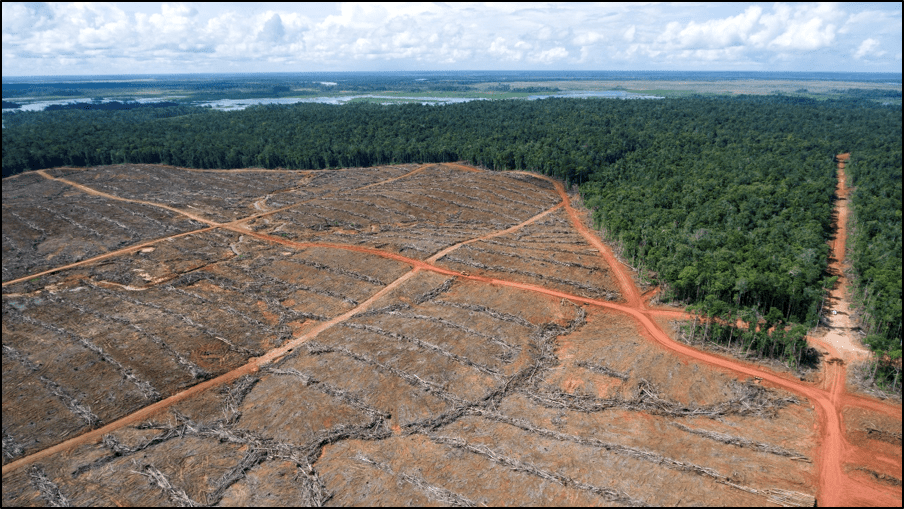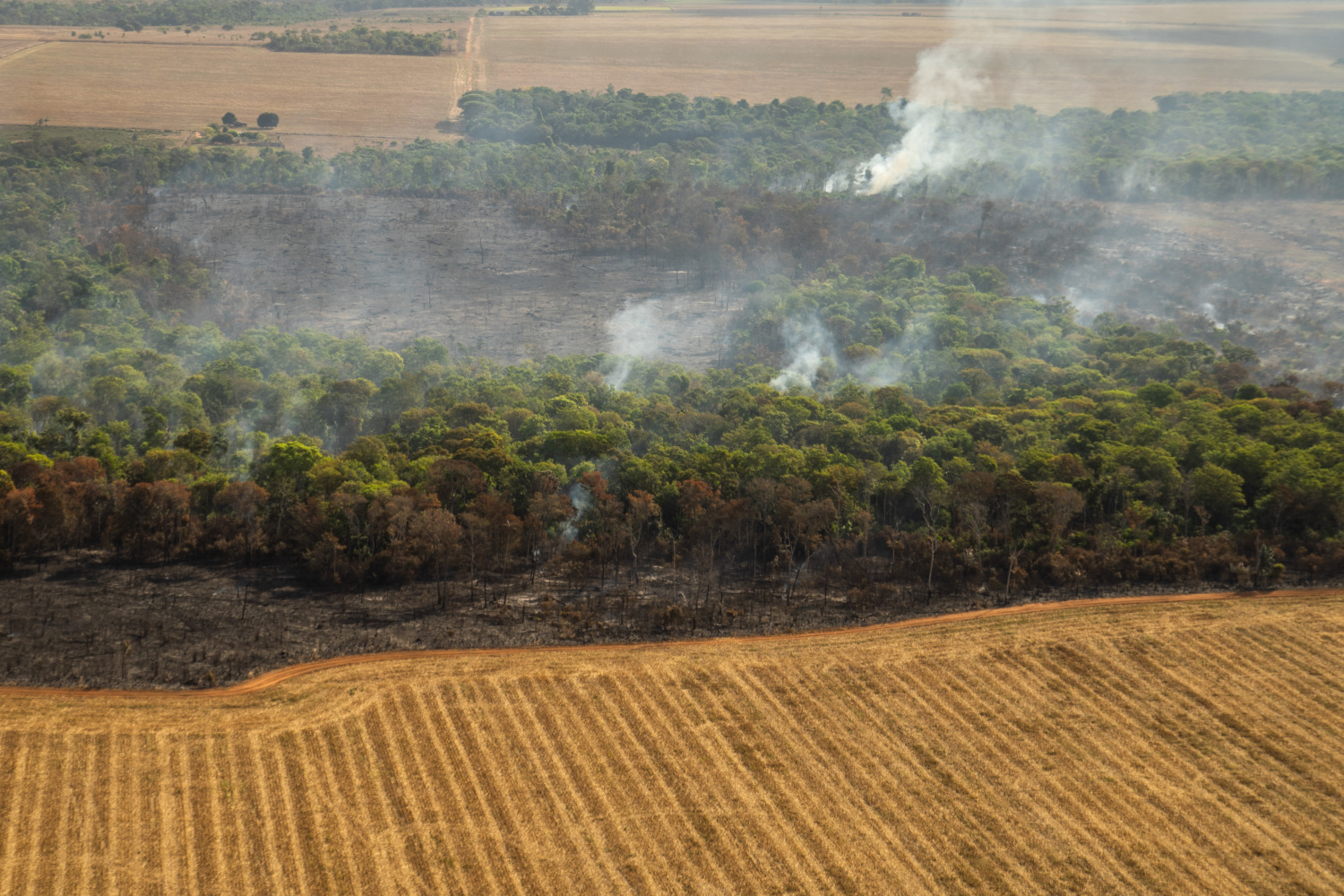
Investigation Finds Papua’s Largest Palm Oil Operator Destroyed Vast Areas of Endangered Rainforest, Cheated and Abused Indigenous People

Bahasa Despite significant censoring, newly released findings from the Forest Stewardship Council show Korindo Group destroyed over 30,000 hectares of rainforest in the past five years, systematically manipulated and underpaid indigenous landowners
BONN, GERMANY – Today, the Forest Stewardship Council (FSC), a global certification body for responsible forest management, released summaries of its findings from a two-year investigation prompted by a complaint filed by Mighty Earth against the Korindo Group, a notorious Korean-Indonesian logging and palm oil conglomerate.
“The severity of Korindo’s wrongdoing revealed in these reports is just devastating, even with FSC and Korindo covering up more than 110 pages of the findings,” said Deborah Lapidus, Senior Campaigns Director at Mighty Earth. “Korindo has long justified its destruction of vast areas of pristine rainforests on the basis of ‘development’ but the reality is just the opposite. These investigations exposed how Korindo went to great lengths to manipulate, intimidate, and cheat local communities. There is no justification that the FSC has gone along with Korindo in burying the full report, as these sorts of practices are all too commonplace in Papua and rarely exposed. Remediation for communities is long overdue, and a full and honest disclosure of the FSC’s findings would do a lot of good.”
For years, even as Korindo engaged in deforestation on a massive scale in Papua and North Maluku, Indonesia, as documented by Mighty Earth, the group has been benefiting from FSC’s prestigious eco-forestry label to sell timber, plywood, pulpwood, biomass, and newsprint to customers such as Asia Pulp & Paper and APRIL (Indonesia), Sumitomo Forestry, Oji Corporation, and Marubeni (Japan), and News Corps Australia.
The FSC commissioned a Complaints Panel to conduct an investigation, and subsequently conducted two additional investigations into Mighty Earth’s allegations against Korindo.
Mighty Earth has consistently called on the FSC to release its findings in full. The main Complaints Panel report, which was originally at least 110 pages in length and scheduled to be released on September 5, was pulled after FSC received a “cease and desist” letter from Korindo. The document released by FSC today has been reduced to a mere one-page summary. The summaries of the two additional investigations include a number of redactions that FSC states are “due to a disagreement with Korindo”.
But even these partial reports paint a damning picture, concluding that Korindo was guilty of flouting FSC standards by violating indigenous peoples’ rights, carrying out significant conversion of natural forests, and destroying significant areas of High Conservation Value (HCVs). The reports detail Korindo’s destruction of over 30,000 hectares of rainforest and endangered species habitat in just the past five years (more than 50,000 overall), multiple failures of Korindo to obtain the Free, Prior, and Informed Consent (FPIC) of local indigenous communities to development on their lands, irreparable damage to ecosystems and watersheds that has led to communities being deprived of basic needs including land, food, water, and livelihoods, and the severe underpayment to communities of revenue from their forest resources. As a result of these findings, the Complaints Panel recommended that “Korindo should be disassociated from the FSC due to the clear and convincing evidence of violations of THR [Traditional and Human Rights] (as well as significant conversion),” as stated in the Social Analysis report released by FSC today (page 41).
Despite this recommendation, the FSC Board decided to reach an agreement with Korindo on improvement and remediation measures. In July 2019, the FSC Board announced that Korindo’s continued association with the FSC would be “dependent on Korindo’s complying with strict requirements towards social and environmental reparations and remedy.” Today, the FSC elaborated on those requirements.
“The remedial measures unveiled today are not proportionate to the extreme violations revealed in the investigative reports,” Lapidus said. “Notably, they fail to include restoration and remedy for Korindo’s clearing of over 50,000 hectares of rainforests and damage caused to the rivers and ecosystems, which violate FSC standards. It is also notable that Korindo’s first act after reaching the agreement with FSC was to bully FSC into censoring the details of its wrongdoing and its liabilities to communities. Korindo simply isn’t serious about accepting full responsibility for its violations of FSC standards.”
The FSC statement claims that the exact remedial measures will be determined in a forthcoming, FSC-led stakeholder consultation “roadmap” process. To date, no further details of this process have been released by FSC.
In September, when the FSC initially postponed the release of these materials, Mighty Earth’s call for accountability and transparency was echoed by community organizations working in Papua:
“Korindo has destroyed community lands and livelihoods without peoples’ consent, robbed communities of their natural resources, subjected people to violence and intimidation, and polluted their rivers – all while hiring mainly workers from outside Papua. Korindo is also not taking its corporate social responsibility seriously,” said Pastor Anselmus Amo from SKP-KAMe Meruake, a Papuan human rights organization. “FSC should consult directly with affected communities to better understand Korindo’s egregious actions and the communities’ views on what fair compensation and remediation measures would be. We stand ready to help resolve this long-standing conflict.”
“For two decades, Korindo has gotten away with violating indigenous peoples’ land rights without exposure, while selling itself in the media as a savior to the Papuan people,” said Franky Samperante of Yayasan Pusaka, which works to defend indigenous land rights in Papua. “Therefore, it is important that the world knows the reality of what has transpired in Papua and North Maluku.”
“Korindo has previously attempted to spin the FSC conclusions as exoneration, but the findings released today prove that claim to be utterly dishonest,” Lapidus said. “If Korindo is serious about cleaning up its heavily damaged reputation, it must stop denying its culpability, embrace transparency, heed the FSC’s requirements for compensation and remediation, and resolve community grievances—including by returning customary lands. Until it does, no companies should be doing business with Korindo.”
“The FSC must stop acting like an industry apologist and release its findings in full. Affected communities and Korindo customers mustn’t be left in the dark. The FSC should immediately commence the process of securing remedy for the severe harms caused, in full consultation with affected communities,” said Lapidus.
Revealing excerpts from the public reports (emphasis added) include:
“The recommendations of the CP were set out clearly in the executive summary of their report (pp.8-9): that Korindo should be disassociated from the FSC due to the clear and convincing evidence of violations of THR [Traditional and Human Rights] (as well as of significant conversion).”
“The conversion was deemed to be significant among others due to its scale of more than 30,000ha in the last five years, due to the failure to protect adequate areas of natural vegetation, and due to the impact that it has had on local communities and in particular the failure to compensate landowners adequately for the timber taken.”
“The only possible conclusion that can be drawn is that extensive abuse has occurred of the rights that are part of the FSC system, as well as all similar standards…these are land rights, FPIC rights, and rights relating to the fulfillment of basic human needs.”
“As a result of these violations, the affected communities have suffered considerable harms. These range from the threat and in some cases use of violence, in an ongoing atmosphere of intimidation (and above and beyond that associated with the prevailing local security setting); the inability to exercise their right to oppose the concession; and the highly disproportionate compensation payments, received by a minority of community members only, and with little knowledge or any participation on the part of many. Just as the CP [FSC Complaints Panel] concluded, this additional analysis thus also finds beyond any doubt that there are strong and sufficient grounds for the disassociation of all the companies associated with these serious violations.”
“Korindo’s activities involved the clearing of substantial areas of Southern New Guinea Lowland Rain Forest which is considered endangered/critical in the Global 200 classification…In addition, the conversion most likely destroyed some areas that provided critical resources for local communities.”
“The evidence is clear and convincing that these HCV’s were for all intents and purposes, destroyed. Rehabilitation efforts would stimulate recovery, but in an ecological context, the landscape has been irreparably altered by Korindo’s commercial activities.”
“The clearing of the riparian areas (streams, rivers, springs, and adjacent to lakes) is not consistent with Indonesian law.”
“The nearly complete transformation of the southern peninsula of Halmahera Island from a mixture of Moluccan moist forest interspersed with shifting cultivation and small coconut groves to large-scale production of oil palm monocrop has had a profound impact on the landscape. The evidence and chronology of the immutable changes to the landscape is very clear and concise…The loss of HCV 1 should be considered destruction because it is not feasible to restore/rehabilitate the area. The conversion of the PT GMM concession presents unique circumstances because it has changed the landscape of entire southern end of the island which also dominates the entire upper portion of the watershed.”
It is also recommended that the companies should also initiate a formal process of remedy with the communities concerned. The CP [Complaints Panel] report has clearly and in great detail verified and elaborated on both the broader patterns and the various individual acts of violation, as had previously also been described and compiled with much supporting evidence in the original reports and in the complaint. There is no more room for reasonable doubt that these multiple violations have occurred.’ ‘There is thus no reason for any further delay in starting the process of remedy that is now required, to be based on engagement with the affected communities in response to all the various violations that have been repeatedly identified, in relation to land acquisition, FPIC processes and HCV protection. A remedy process should be initiated with all the affected communities referred to in these documents as having expressed unhappiness, ongoing grievances and frustration with the outcomes of the operations, and/or well-substantiated allegations of violations of their THR [Traditional and Human Rights]’.
Read more excerpts and background here


